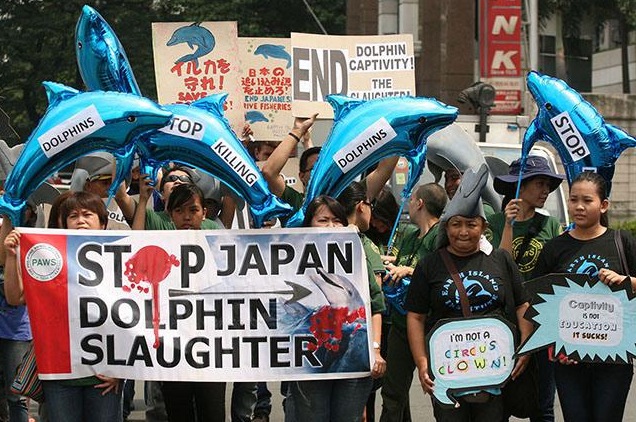SeaWorld should sigh in relief, because the heat has turned away from them and onto something bloodier and even more disturbing, organized dolphin slaughter. The world’s largest zoo organization, the World Association of Zoos and Aquariums (WAZA), has recently been linked to Japanese drive hunts as a source of show dolphins.
Japanese drive hunts are where hunters lure drives of dolphins into a given area such as a cove or shallow bay, where from that point, they use nets and speedboats to grab as many dolphins as possible. For the dolphins that aren’t sold to private owners or businesses, the remainder are killed on-site and left to rot in the water. The average hunter can earn between $41,600-47,746 for a well-tempered, easily trainable dolphin that can be used for show, while the other not so lucky creatures are sold to butchers as cheap meat.
Australia for Dolphins, the non-profit animal rights organization that is accusing WAZA of the disturbing connection, sent their organization’s CEO, Sarah Lucas, to the WAZA headquarters in Geneva, Switzerland, to hear a statement from the company, but was told by a WAZA representative, that the way in which the dolphins were obtained for their zoos and aquariums, were done in a way that was normal to the Japanese culture.
In a previous article of mine about the accusations of animal abuse at SeaWorld, I discussed how boycotting certain businesses who work in a way the consumers feel is unethical, was the best way to create internal and authentic change the consumer desires; verses regulation and government intervention in the market. Since WAZA is a global chain, it would require a boycott of every zoo and aquarium associated with them to make any kind of difference, yet that method is too grand in scale to be seen as a practical approach to dealing with this issue.
Plenty of grassroots attempts have been made to bring awareness to the Japanese drive hunts that WAZA has been specifically connected to. The 2009 documentary “the Cove” captivated audiences across the globe as filmmakers exposed the brutality inflicted on dolphins season after season, in Japan. Uproar from “the Cove” caused a spring of similar films discussing Japanese drive hunts, and a media frenzy surrounding the issue of ethical animal treatment.
Since the chain of WAZA zoos and aquariums is too large to take head on, keeping WAZA accountable is going to involve more effort that simply boycotts. Since every Tom, Dick, and Jane on Earth is connected some way to social media, the ability to become your own press doesn’t require more than a phone with video and internet connection capability. This access to sharing information with millions in an instant has turned the average Joe into an investigative reporter. From police abuse, to war zones, and undercover stings, new media is a powerful way to keep these organizations accountable to the public they serve.
WAZA has enough clout and influence to push these accusations aside for many more years. The only true way to save these dolphins from abuse and inhumane treatment in this case, is for private citizens to continue putting forth evidence of connections to these Japanese drive hunts that WAZA can’t continue to run away from. After all, its hard to lie when you’ve been caught red-handed with Flipper dead in the corner.




